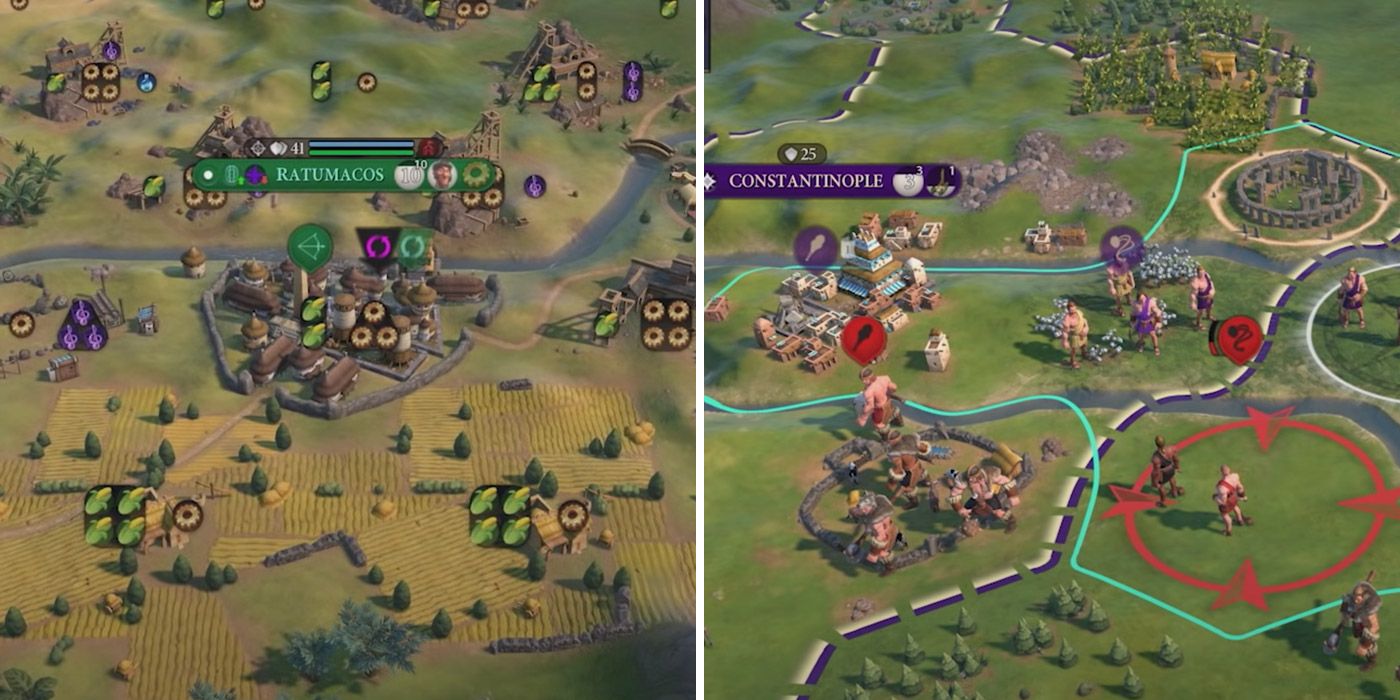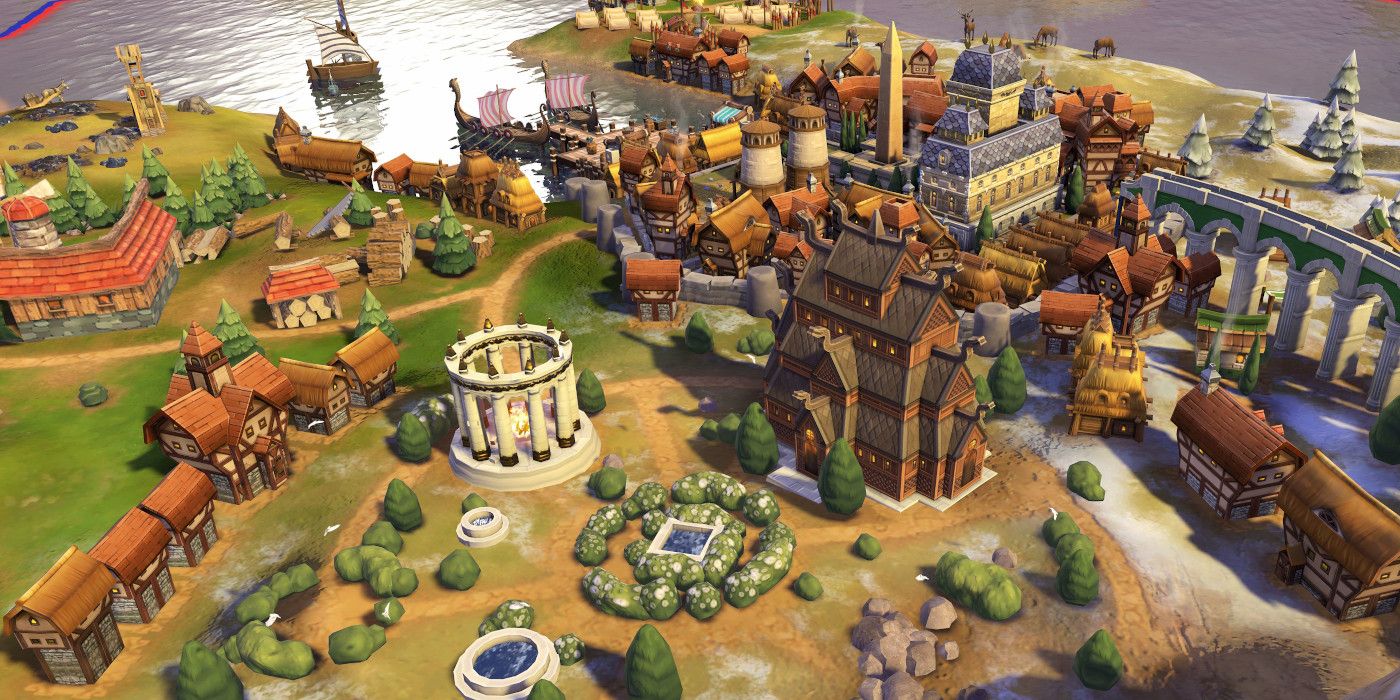Civilization 6's latest Frontier Pass Expansion Pack has arrived, bringing the Gauls and Byzantines into Firaxis' historical strategy. As well as the pair of new leaders for players to choose from, the expansion also adds a new Civilization 6 game mode.
Dramatic Ages alters the Era Score mechanics that were first introduced in the Rise and Fall expansion. Players who own Rise and Fall earn Era Score by completing great deeds, building Wonders, exploring the world, and defeating their foes. Depending on how much Score a player has earned by the end of an Era, they will spend the next Era in either a Dark, Normal, Golden, or Heroic Age. Dark Ages give penalties, while Golden and Heroic Ages unlock powerful buffs. The Dramatic Ages mode takes those bonuses and penalties, and turns them up to eleven.
The Brightest Age
In a standard game of Civilization 6: Rise and Fall, Golden Ages are earned when a player gets 12 or more Era Points above the Dark Age threshold. They represent a period of inspiration and growth, and give access to powerful Dedications. They also increase the Loyalty pressure of the player's cities, allowing the possibility to cause neighboring cities to rebel. Golden Ages in the Dramatic Ages game mode are even more powerful, granting larger increases to Loyalty pressure, as well as unlocking special Policy Cards. These cards take the place of Dedications, which don't exist in the Dramatic Ages mode.
The increased Loyalty pressure is the biggest advantage of the new Golden Ages, particularly if other civilizations have entered a Dark Age. Because the era changes for everyone at the same time, getting a Golden Age at the right moment may allow a player to conquer several cities from other civilizations without having to lift a finger.
The Darkest Age
While Dark Ages are generally negative in Civilization 6, some players aim to get them on purpose. This is because of their unique Policy Cards, their manageable downsides, and the possibility of entering a game-changing Heroic Age afterwards. However, in Dramatic Ages, the time of heroes is definitely over, and Heroic Ages have been removed from the game entirely.
To make matters worse, Dramatic Ages also massively boosts the biggest downside of a Dark Age: loyalty problems. While a Dark Age in the base game will cause a player to have to work to keep their cities loyal, entering one in Dramatic Ages will immediately cause a number of cities to rebel. These Free Cities will then exert Loyalty pressure on others around, potentially spreading the rebellion.
There are only two ways to reclaim Free Cities in Civ, either by putting enough Loyalty pressure on them that they change back or through conquest. The problem is that these options aren't only available to the player that founded the city in the first place. A player who loses cities to a Dark Age in Dramatic Ages may find their neighbors snap them up before they can.
Desperate Times, Desperate Measures
Dark Age Policy Cards have been around since the release of the Rise and Fall expansion, but Dramatic Ages expands on them significantly. While all Dark Ages Policies still have positive and negative aspects, several of the bonuses have been greatly increased. In addition, there are a few new Dark Age Policies that aren't available in the base game. Here are some examples of the kinds of Dark Age Policy Cards on offer:
- Isolationism: Domestic Trade Routes provide +3 Food, +3 Production, and +3 Gold. But can't train or buy Settlers, nor settle new cities.
- Decentralization: Cities with less than 6 Population receive +4 Loyalty per turn. But cities with more than 6 Population receive -15% Gold.
- Monasticism: +75% Science in cities with a Holy Site. But -25% Culture in cities without a Holy Site.
- Elite Forces: +100% combat experience for all units. But +1 Gold to maintain each Spy and Military unit.
- Inquisition: Start Inquisition with 1 Apostle Charge. All Religious units gain +15 Strength in friendly territory. But -15% Science in all cities.
Bold New Policies
As well as altering Dark Age Policies, Dramatic Ages also adds brand new Policy Cards that can only be used in Golden Ages. These Golden Age Policies are powerful upgrades that take the place of the Dedications in the base game. Unlike the Dark Age Policies, they don't come with any downsides either. Here are some examples of the kind of Golden Age Policy Cards on offer:
- Monumentality: +2 Movement for Builders. Civilian units may be purchased with faith. Purchasing Settlers and Builders is 30% cheaper in every situation.
- Exodus of the Evangelists: +2 Movement for religious units. Newly trained religious units receive +2 charges. +4 Great Prophet points per turn.
- Mandala State: +4 Culture to Wonders. All Wonders inflict -2 Loyalty on cities not owned by you within 9 tiles.
- Sakdina: While Projects are active, each Citizen exerts +0.5 loyalty pressure to their city. When Projects complete receive +10% additional Great People points for every Building in that Project's district.
- Praetorian Guard: Wounded units heal +10 HP per turn. +2 Production towards Encampments and their buildings.
- Reform the Coinage: Traders cannot be Plundered. International Trade Routes provide +3 Gold per specialty district in the foreign city.
Dramatic Ages is an interesting new take on the classic Civ formula, forcing players to plan centuries ahead. Dark Ages are inevitable, and players must learn to ride out these storms as well as they can. Then, during the good times, use Golden Age bonuses to strengthen their civilization, allowing it to grow and prosper.
Civilization 6 is available for iOS, Linux, Nintendo Switch, PC, PlayStation 4, and Xbox One.



